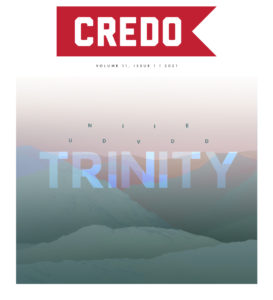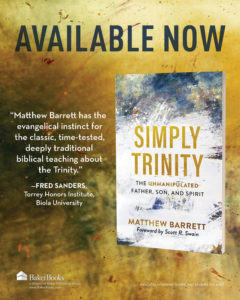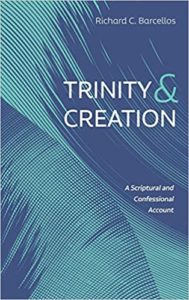
The Heavens Declare the Glory of God: An Interview with Richard C. Barcellos
T he new issue of Credo Magazine focuses on the trinity. The following is an excerpt from one of the issue’s featured interviews with Richard C. Barcellos, Pastor of Grace Reformed Baptist Church, Palmdale, CA, and Associate Professor of Exegetical Theology at IRBS Theological Seminary.
he new issue of Credo Magazine focuses on the trinity. The following is an excerpt from one of the issue’s featured interviews with Richard C. Barcellos, Pastor of Grace Reformed Baptist Church, Palmdale, CA, and Associate Professor of Exegetical Theology at IRBS Theological Seminary.
At first glance, the reality of creation seems to pose a problem for classical doctrines like divine simplicity and immutability. Did God change at one point from being a potential Creator to being an actual Creator? Does creation not flatly contradict divine immutability? According to Richard C. Barcellos, the church’s confessional witness, and the scriptures they exposit, answer “no.”In this interview we discuss Barcellos’s new book, Trinity & Creation: A Scriptural and Confessional Account, a defense of the doctrine of creatio ex nihilo in classical Trinitarian perspective, over and against recent revisionist accounts.
Could you share with our readers the impetus for your recent book, Trinity & Creation: A Scriptural and Confessional Account. How did this project come about?
Years back I was tasked with giving lectures on the Second London Confession of Faith (1689), specifically chapter 4 (“Of Creation”). I immediately began reading on the issue. The confession says, “In the beginning it pleased God the Father, Son, and Holy Spirit, for the manifestation of the glory of his eternal power, wisdom, and goodness, to Create or make the world, and all things therein…”
As I contemplated this formulation, I became fascinated with two things: first, that creation is a trinitarian act and second, that this one act of creation by the triune God manifests divine power, wisdom, and goodness. As my lectures developed, I soon realized that the topic I was tasked to address was way larger than the lecture time allotted me. After delivering the lectures, I began wondering if the lectures could be turned into a book. So I further developed the lectures and then sent the manuscript out to a few friends, asking if they thought this material was worth developing further. The response was positive so I went back to work for two years, finishing the book around the end of 2018.
Sticking closely to the scriptures, reformed confessions, and seventeenth century theologians, you go into great lengths in this book to emphasize that “Creation” describes all that is not God. In this way, you show that Creation cannot even be comprehended as a coherent concept apart from its relationship to God, and therefore theology proper must precede any meaningful claim about creation. Why is this methodological strategy so important?
Good question, and very important. The issue here really concerns hermeneutics and theological method. Hermeneutics refers to methods of interpreting texts and theological method refers to how we formulate doctrinal assertions. In the book I attempt to show that the Bible itself requires at least two things: first, all scriptural texts come in the context of all other scriptural texts and, second, therefore, all scriptural texts must be factored into any doctrinal assertion. When this is done properly, one realizes that the Bible is written revelation from God who is the eternal Father, Son, and Holy Spirit, given the Bible or not.
This means it is God the Trinity who manifests himself in creation, providence, redemption, and consummation. God effects all that is not God. In order to understand the productions of God, his effects, his works, it is necessary to first understand the God who produces those works. Though we can and do know things about the Creator through his works of creation and providence, we can know God as Trinity only through scripture. As we put together the teaching of Scripture about its triune author, who is also Creator of all, we learn that he is simple, immutable, infinite, eternal, and, therefore, he is these things with or without creation. So, given creation and providence, Scripture teaches us that the God who does these things is the same throughout his various works, and “before” them. This entails that no work of God changes God in any sense.
That being the case, what God does in no way constitutes God as God. Divine works do not make God something he was not without creation. This has massive implications for how we interpret scripture. One of those is that texts which speak of change in God must be filtered through a hermeneutical-theological grid, a grid required by scripture itself. Scripture speaks of God as he is in himself, given creation or not (e.g., “I AM”). This is important to recognize and important to account for. The best way to account for such is to have a scripturally-grounded theology proper (i.e., theologia, divine unity and Trinity) firmly in place as we seek to interpret the economy (i.e., oikonomia) of God as revealed in the written word of God.
Consider one prime example. John 1:1–2 is theologia: “In the beginning was the Word, and the Word was with God, and the Word was God. He was in the beginning with God.” These verses refer readers back of the oikonomia to its trinitarian source, here indicated by two divine persons in transcendent relation without creatures. John 1:3 says, “All things were made through Him, and without Him nothing was made that was made.” These words introduce readers to the oikonomia (i.e., creation), effected by virtue of theologia, though here appropriating creation to the Word or Son. Then in verse 14 we read: “And the Word became flesh and dwelt among us.” Here is the oikonomia narrowly considered—the incarnation of the Word. The order in this passage is very instructive. First theologia then oikonomia. First God in se then God pro nobis.The act of creation does not change God; it brings being into being that did not exist but now does and is in constant flux. Click To Tweet
It may be tempting for most Christians today to assume that creation signifies a change in God. That is, before creation, God did not have the title of “creator” until after that potential title was actualized in the act of creation. And yet, you show seventeenth century theologians like Johannes Wollebius, William Ames, Francis Turretin, and Herman Witsius go out of their way to deny that conclusion. Why is that?
They want to affirm, and I think rightly so, that given creation or not God is immutable. The act of creation does not change God; it brings being into being that did not exist but now does and is in constant flux. The title “Creator” itself came into being with creatures. This does not require God coming into being as Creator. As creatures are related to God we use terms to describe that relationship, e.g., Creator, Lord, King. But these titles do not change God or make him in some sense something he is not eternally. They simply indicate a relationship we creatures have with him this side of creation. God in se is all that is needed for God pro nobis.
**Read the remainder of Richard Barcellos’ interview in the latest issue of Credo Magazine.



